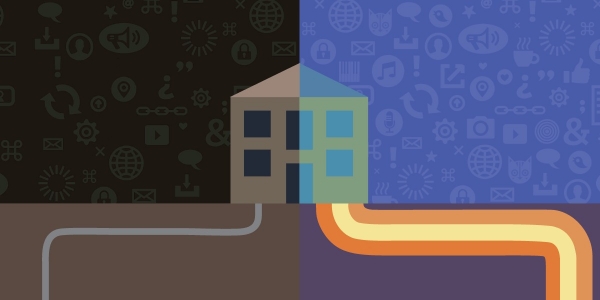Why and how to avoid slow Internet Access Networks
We may learn from North Dakota (if we ask all the right questions)
An article at the Electronic Frontier Foundation rightly argues against funding “obsolete network that can not even keep up with “normal usage” of the Internet today”.
The only real choices in broadband today are high-speed cable and fiber-to-the-home, both for passive usage (downloading movies) and interactive services, e.g. video conferencing.
If a provider spent 500 USD for “a $500 connection giving a basic slow speed, no one would willfully pay for its use unless given no other choices”.

Shall we keep the cheap, small, NARROW broadband (left), or add real fiber-based broadband (right)?
</em></u>
Now, take the same scenario, says the article, but investing $5,000 for fiber connectivity. If a provider or funder can wait ten or twenty years to recover the infrastructure investment, it can accept monthly payments “around $42 or 20 USD per month plus interest”. But it could offer immediately to all its users a network that is perfectly adequate to all current needs, most future ones, and even be a backbone for wireless networks, “with very little additional money needed to upgrade”.
You will still have willing buyers for all that fiber capacity, says the article, “because it remains relevant”, and still makes financial sense, for decades. When looking at state-funded internet access networks, this would mean that…
“When Metrics Are Set Appropriately High, The Government Has Saved Money”
[Among the USA states] that received tens of millions of dollars from the federal government for broadband, almost all lack dense fiber networks - with the exception of a state like North Dakota.
This is due to what the local governments and small private ISPs in North Dakota actually made with that government money. Instead of keeping alive offers for connections as slow as 10 mbps/1 mbps, or minor improvements and maintenance to legacy networks, they matched federal funding with local investments to directly build fiber networks.
Now those networks are being paid off in the long run [and will offer fast, advanced services] “well into the 21st century, without government subsidies”. And the local, state, and federal governments no longer need to come back and spend money to replace anything there.
What is good and what is bad
Exactly three months ago, I reported very similar conclusions, and complaints from Italy, that is from political and market contexts not really similar to North Dakota. That EFF piece confirms the validity of certain questions, if nothing else because these days broadband is also needed for informed voting. As final considerations and food for thought, I can only add that:
- it is good to not see, in a piece about “real choices in broadband”, something as hyped as 5G
- it is bad to forget how much of the broadband is wasted today on addictive social networks, pointless fights, giving up ownership of one’s documents, or stopping to have documents altogether
The second point is, of course, the most important. Broadband is good, but not if it is used to perpetuate and strengthen the same “offer” of today.
Who writes this, why, and how to help
I am Marco Fioretti, tech writer and aspiring polymath doing human-digital research and popularization.
I do it because YOUR civil rights and the quality of YOUR life depend every year more on how software is used AROUND you.
To this end, I have already shared more than a million words on this blog, without any paywall or user tracking, and am sharing the next million through a newsletter, also without any paywall.
The more direct support I get, the more I can continue to inform for free parents, teachers, decision makers, and everybody else who should know more stuff like this. You can support me with paid subscriptions to my newsletter, donations via PayPal (mfioretti@nexaima.net) or LiberaPay, or in any of the other ways listed here.THANKS for your support!